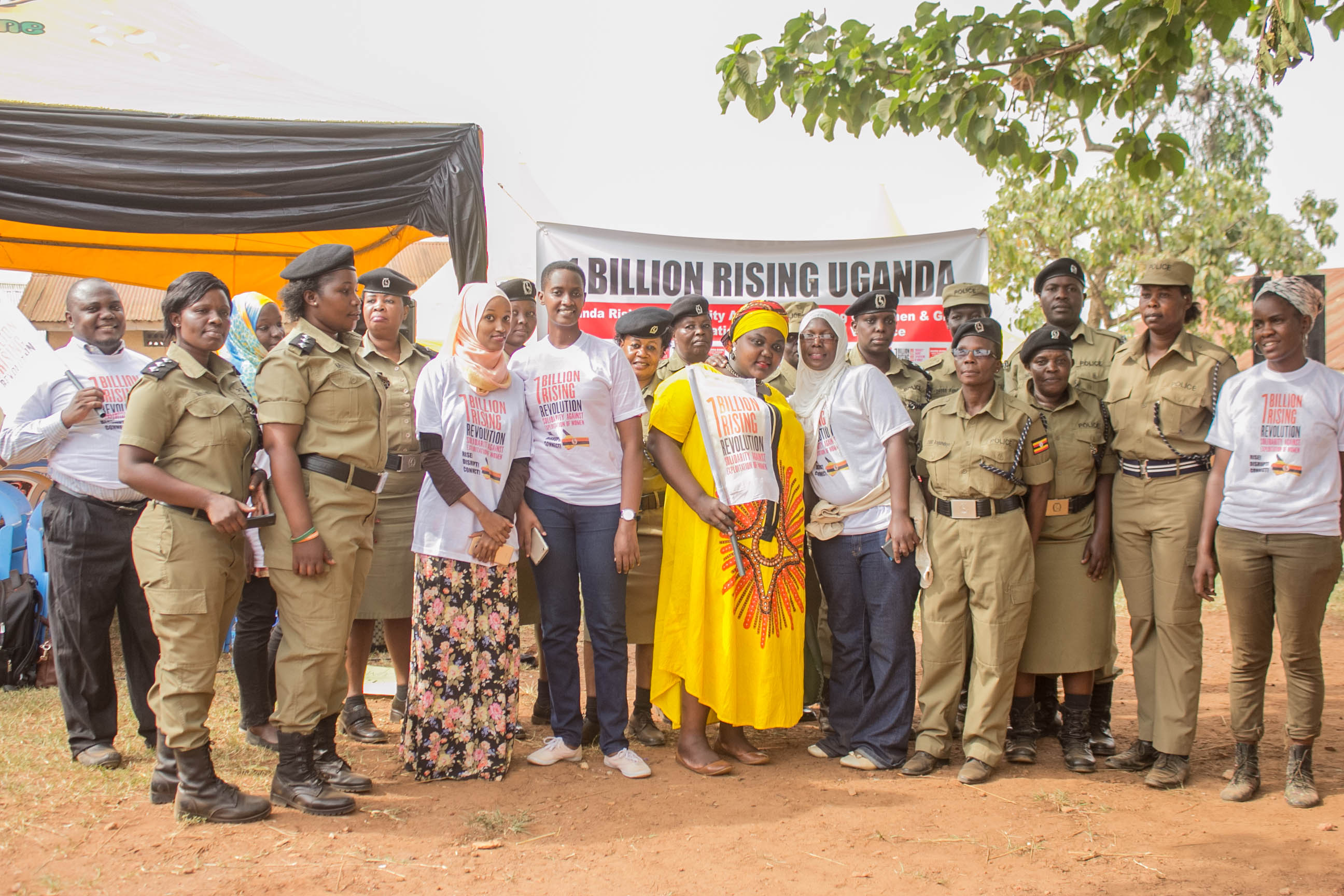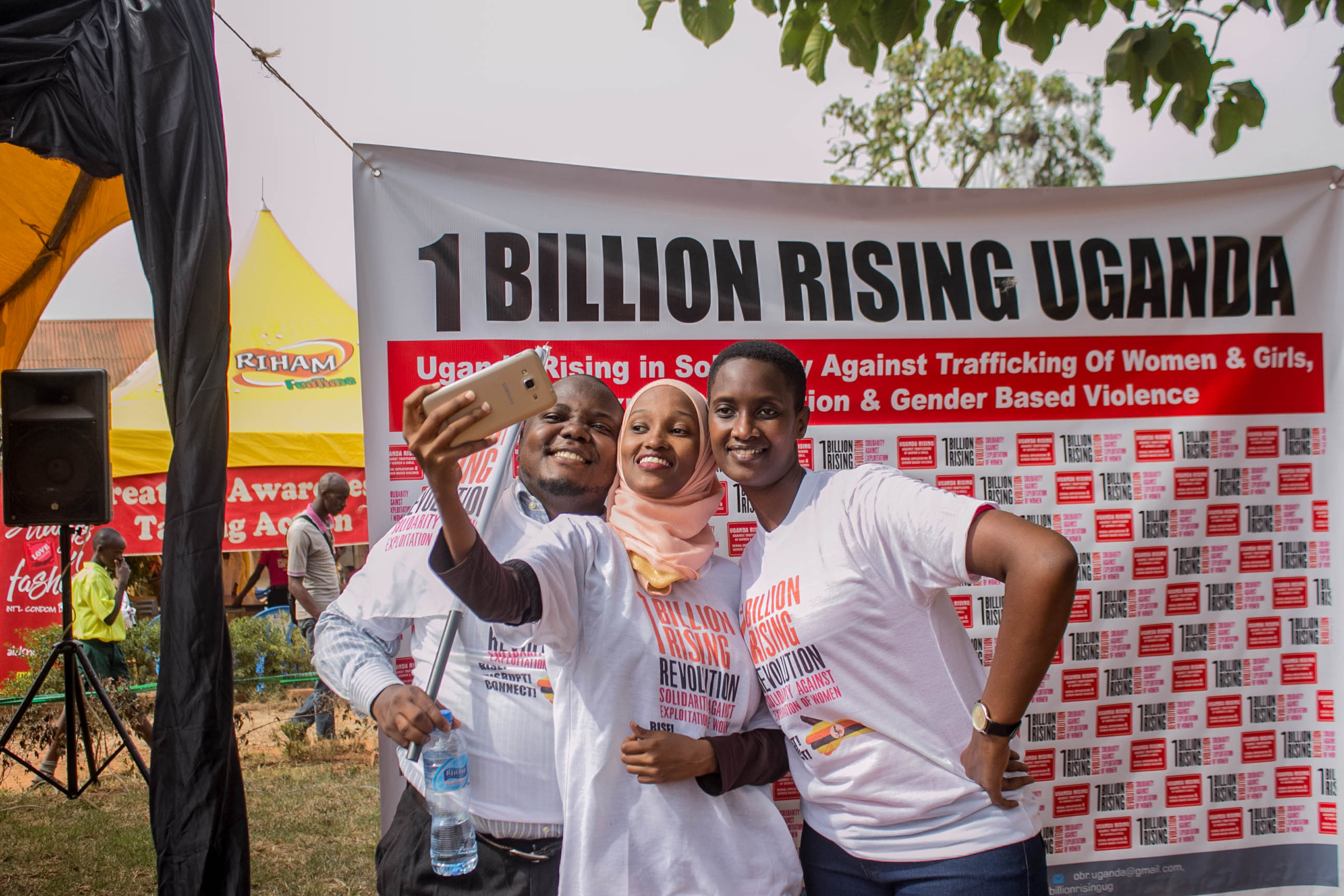
The focus of the Uganda national OBR campaign was Trafficking of women and girls, Sexual exploitation and gender based violence.
Here in Uganda, despite all government efforts to combat violence and exploitation of all forms against women, like the Domestic Violence Act (2010), the Prohibition of Female Genital Mutilation Act (2010), the Prevention of Trafficking in Persons Act (2009), and the employment Act (2006), enforcement remains very weak and a lot more still needs to be done.
Only two in ten women and girls in Uganda report violence and seek help. Our rate of perpetrator conviction is also still extremely low, only standing at 6.6% in 2011 according to the annual police crime report. According to Save the Children, in Uganda at least 21 children are sexually abused everyday, most of whom are girls.
Regarding trafficking in persons, it still remains a growing trade. Uganda still remains a source, transit, and destination country for men and women subjected to forced labor, and sex trafficking. In 2013 alone, according to an Annual report on the Trend of trafficking in persons in Uganda, for both internal and transnational trafficking in persons, there were far more female adults and female children victims registered than men.

Further still in 2016, painful stories flooded our mainstream and social media of young girls that had been taken to especially Middle Eastern countries under the guise of getting them well paying job opportunities. In the end, these girls had been turned into sexual slaves, and also heaped with huge work with little or no pay. The overwork resulted into death for some of them. A key push factor of this is the high level of youth unemployment at 67% according to government estimates, and standing at 83% according to African Development Bank. This same factor has also forced women to stay in abusive relationships and marriages as they cannot imagine how they will cope without the little financial support they get from the men.
This is the basis against which we chose to focus on trafficking, sexual exploitation and gender based violence for One Billion Rising Uganda. For us these issues are highly inter-connected and re-enforce each other.
And what particular VAW issues did you highlight and why?
Both online and at our campaign climax, the following issues were highlighted-
Statistics to bring people’s attention to the extent of the problem: – Working with the Uganda Police Force, and the Anti-Trafficking Desk under the Ministry of Internal Affairs, we highlighted the numbers around violence against women including sexual violence in our country with special emphasis on the Slum community of Katwe. We also highlighted numbers around trafficking of women and girls.
Contacts to centers for victim’s support- We invited representatives from relevant government bodies, civil society, and faith institutions to share about the specific help and support their organizations give to women victims and those threatened by violence and different forms of exploitation like trafficking.
the male students of Ndejje university, men were mobilized to stand up for their mothers, sisters, wives, aunties, and all women to ensure communities are safe and secure for women and girls to thrive, and to live up to their full potential.
Damaged women, damaged dreams, and damaged children: – we highlighted the dangers and multiplier effect of violence and exploitation against women in all its forms. Emphasizing that without proper support, and rehabilitation, such acts damage the esteem of women for good, and ultimately affects their children.
A new day: – We highlighted that despite the pain that comes with such acts of violation and exploitation, women and girls can step out of the past and create a new day for themselves. We shared about development organizations like the Uganda Women Entrepreneurs Association where they can find positive role models, and programs that can up-lift them emotionally and economically.

The following are what we feel were the impact of our OBR Uganda campaign:
The following were the strategies we implemented to run the OBR campaign:
Securing government permits in time: In Uganda 5 people and more cannot converge unless they explicit written permission from the Uganda Police. Getting this permission in time gave community leaders and other participants confidence that our campaign was legal and in order.
Negotiation: This worked well getting Artists on board. We met Artists at the national theater of Uganda for a one on one meeting about the campaign. While they would be expensive to hire under normal circumstances, we negotiated for a deal where we catered for transport refund for the artists, and meals for them through our campaign as a basic facilitation for them to perform at our event.
Utilizing local means of communication: Local communities have area- based loudspeakers that they use daily to make announcements, and people pay attention to them. We paid airtime for 1 week on these stations to publicize the campaign and also educate people. Since they were located within our primary target community in Katwe Slum, they had an opportunity to ask us their questions directly which was very engaging.
Art for mobilization and social engagement: We hired a Brass band, and then also facilitated 1 dance and 1 Martial Arts group to perform with the community as a sign of solidarity against violence and exploitation of women. This gained a lot of attention. We also worked with the community and the Sophie Muwanika Art Institute to paint a community wall agreement as our sign and promise to keep our communities safe and secure for women and girls.

We facilitated different artists to help make the campaign more exciting, entertaining, and yet very educative and inspiring.
The feedback we got from the OBR campaign was very inspiring.
From the community:
From the Government:
From NGO’s and civil society:
From the Business sector:
In Uganda we were rising for the first time this year. There were a number of challenges as highlighted but we appreciate the opportunity given to us and we hope to keep improving for a higher impact.

The following issues are what we feel are the biggest issues facing our country and communities, gravely affecting our women and girls. And we would like to continue to highlight these issues for OBR 2018
Young women and girls were very excited about the theme of “Solidarity Against the Exploitation of Women” and readily shared about the campaign across their networks. Many of the older women on the other hand had this kind of resignation of; “That’s just the way it is, we can’t change much.” But men and women including senior officers in the police circle were very enthusiastic and helpful. They readily shared statistics and worked with us all through-out.
We will definitely join the campaign again in 2018, more specifically in the area of working with artists like writers, sound composers, singers, dancers and poets to equip the women with real skills and capacity to tell their stories through art & theater and find their voice.
Our plan for 2018 is to direct this training to culminate into a festival where local women present their creations, rather than just bringing others to talk at them- helping them find their voice.
Our future lies in the young people; their talent, their ambition, their values, their drive, and their dreams. We could put this challenge in their hands; “What will the future of women be in your hands?”
Specific activities could be Essay writing Competitions, Poetry Creation and Recitals, Photo Exhibition, hosting kids on radio talk shows to engage with community leaders on issues that matter to women and girls, and buying and giving flowers to women in hospital and in custody on valentines’ day with a massage of hope.
For OBR 2018, in Uganda, we would love to remain with the theme of “exploitation” – but more specifically – the theme of “Rising against Economic and Sexual Exploitation of women”.
This is because worldwide, especially in developing countries, as the level of unemployment and underemployment grows; women are becoming more and more vulnerable to economic and sexual exploitation. A number of potential employers ask for sexual favors from women before they can grant them a job. But also others are increasingly being tempted to seek for economic opportunity outside their countries of origin. Here many are dragged into slavery and all forms of sexual abuse.
Depending on the country, there are different kinds of influencers who when they are part of a cause, the community will take heed. In Uganda to further amplify this great cause, it would be great to strategically include Religious leaders, cultural leaders and Music icons.
This could be a strategic move where country coordinators are encouraged to not just reach out to media, women activities and other parties but, to also strategically reach out to these influencers as a way of legitimizing the cause but also shining more light on it.